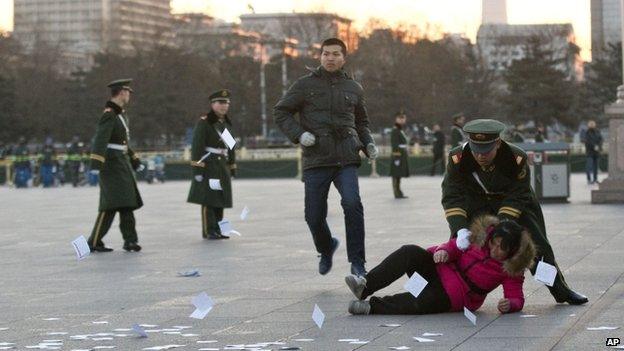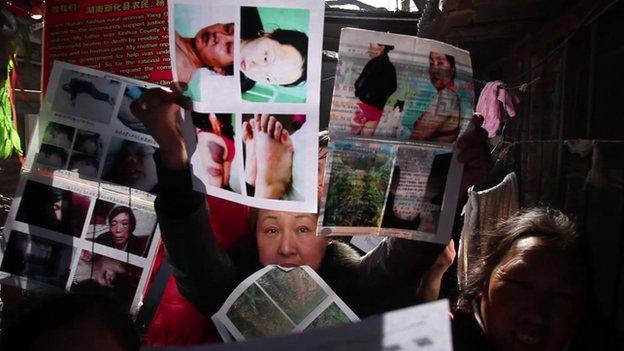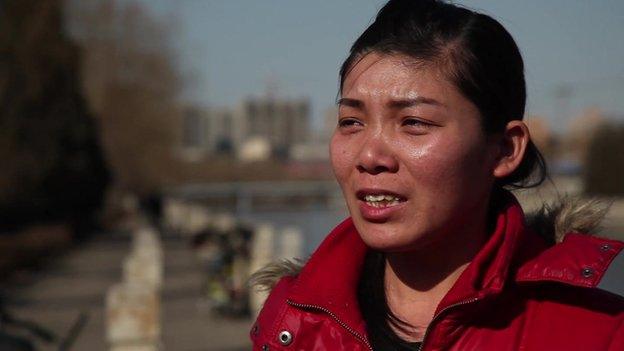How Chinese petitioners keep hope for justice alive
- Published
Petitioners in Beijing as legislative season begins
China's National People's Congress - the country's annual legislative session - is political theatre on a grand scale.
It was hard not to be impressed by the orderliness of the event as thousands of delegates streamed into the Great Hall of the People on Tiananmen Square - the symbolic heart of power in China - for the opening address by the country's premier.
Security is tight for the 10-day event; the authorities leave nothing to chance, not wanting anything to mar the carefully choreographed political event.
But on the opening day, a petitioner broke through the security cordon scattering leaflets across Tiananmen square. She was quickly bundled away by the paramilitary police - it was as if the protest had never happened.
It was a reminder of the seething anger in China felt over a host of issues ranging from corruption and police brutality to government land seizures.
Last resort

Security was tight during China's National People's Congress in Beijing
Every year, tens of thousands of petitioners stream into the capital to seek justice by appealing to the country's rulers. The tradition dates back to imperial times.
In today's China, citizens who get nowhere in the courts can register their complaints in the capital to try and get a fresh hearing. It is an appeal of the last resort.
The tradition taps into a deeply held view here in China that while many local officials are corrupt, the central leaders are pure and honest. If only an upright official could hear our case, many petitioners believe, then everything would be resolved.
Down one narrow Beijing alleyway, lurking in the shadows, we found a group of petitioners. They held up posters, banners, photographs and legal letters documenting their cases. It was a catalogue of abuse.
The anger and grief was palpable, the desperation sometimes too much. Tan Zhonggang, 51, started screaming when he saw us. He dropped to his knees, and clasped his hands in front of him, begging to be heard.
Mr Tan had been injured in a work accident while working as a mechanic at a garage. He injured his hand and then lost his job. He says he received no compensation. "What kind of society do we live in?" he cried.

Citizens who are unsuccessful in the courts can register their complaints in Beijing
More than 20 petitioners live in squalid conditions, crammed into rooms. They pay about $2 (£1.20) a day for their rent.
Among the petitioners was Yang Qinghua, 31, from the south-eastern province of Hunan.
She said that her family was embroiled in a land dispute with a neighbour when her father was savagely beaten. He later died from his injuries.
Ms Yang said that her father's attacker was never charged because he was a former policeman.
"My father died without closing his eyes," she said. "Before he passed away he said that he would keep his eyes open until he received justice. He was also looking out for his attacker."
'Good policies
This is her fifth trip to the capital - a journey of more than a 1,000km (621 miles) from her home. She has given up her job as an accountant in order to pursue justice.
Each time, she has registered her complaint at the central petitioning office called the State Bureau for Letters and Calls. But she has heard nothing from officials and her case has not been reopened.

Yang Qinghua believes she will get justice for her father, who died following a beating
Instead, she says, she has been beaten and detained by government-hired thugs before being sent home.
The central authorities turn a blind eye to these extra-judicial detention facilities often referred to as "black jails". They fear that the thousands of petitioners could potentially form a dangerous protest movement in the heart of the capital.
Local officials also want to stop petitioners from registering their complaints, fearful that stories of corruption and abuse could ruin their career prospects.
Astonishingly, despite all that she has been through, Ms Yang still believes she will get justice.
"The social situation is better than it was before," she says. "President Xi has a good set of policies that will benefit the people."
A spokeswoman for the National People's Congress has said that the government will increase legal support for the country's petitioners.
Fu Ying said that the system had played an important role in facilitating communication between the government and the people.
The reality is, however, that only a tiny number of cases are ever resolved. But petitioning remains a useful way for the government to channel society's anger.
Because if petitioners lose all hope, then the government fears what these desperate people might do.
- Published5 March 2014
- Published5 March 2014
- Published5 March 2014
- Published2 July 2013
- Published2 December 2011